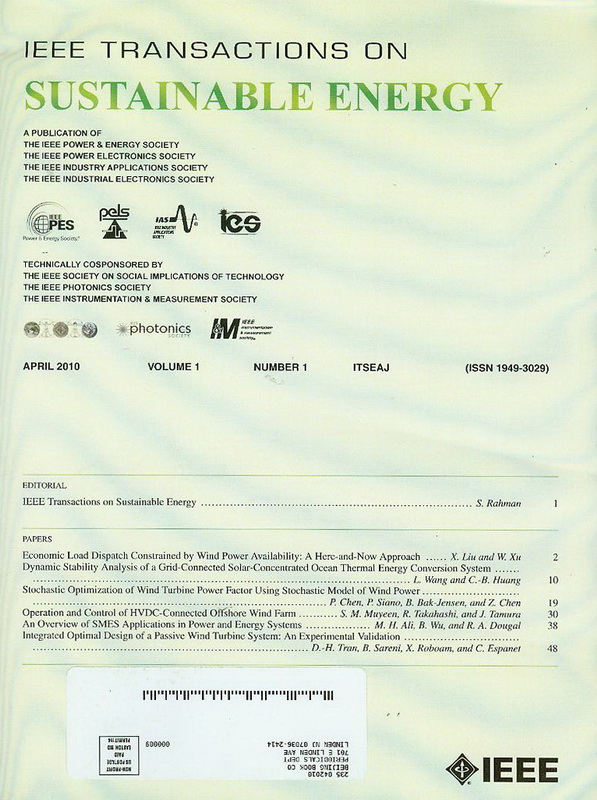考虑多状态变量耦合约束的dfig风电场功率支持能力建模与频率协调控制
IF 10
1区 工程技术
Q1 ENERGY & FUELS
引用次数: 0
摘要
在大型风电场中,风力发电机组的运行状态各不相同,这对电力系统的频率控制提出了严峻的挑战。双馈感应式风力发电机组可以通过改变旋转动能来协调参与频率控制。风电场的协调控制通常以准确评估DFIG的电力保障能力为前提。然而,评估主要集中在风速和转子转速等单一变量的影响上。忽略转子转速、俯仰角和转子电流对PSC的耦合约束。风电场的PSC仍然难以准确评估和充分利用。因此,分析了DFIG在机械功率动态变化下的功率特性。建立了考虑多状态变量耦合约束的DFIG的PSC模型。然后提出了考虑转子转速、俯仰角和转子电流耦合约束的PSC评估方法。提出了考虑DFIG不同运行状态的DFIG贡献分配方法,并提出了基于DFIG的风电场频率协调控制方法。通过实例验证了该方法的有效性。本文章由计算机程序翻译,如有差异,请以英文原文为准。
Modeling of Power Support Capability and Frequency Coordinated Control of DFIG-Based Wind Farm Considering Coupling Constraints of Multi-State Variables
The operational states of wind turbines are different in large-scale wind farms, which presents serious challenges to the frequency control of power systems. The doubly fed induction generator-based wind turbine (DFIG) can be coordinated to participate in frequency control by altering the rotational kinetic energy. The coordinated control of wind farms is usually conditioned by the accurate assessment of the power support capability (PSC) of DFIG. However, the assessment mainly focuses on the influence of single variables such as wind speed and rotor speed. The coupling constraints of rotor speed, pitch angle and rotor current on the PSC are ignored. The PSC of wind farms is still difficult to accurately assess and fully utilize. Therefore, the power characteristics of DFIG under dynamic variations of mechanical power are analyzed. The PSC of DFIG considering the coupling constraints of multi-state variables is modeled. Then the assessment method of PSC considering the coupling constraints of rotor speed, pitch angle and rotor current is proposed. The allocation method of the contribution of DFIG considering different operational states of DFIG is proposed, and the frequency coordinated control method of DFIG-based wind farm is proposed. The effectiveness of the proposed method is verified by case studies.
求助全文
通过发布文献求助,成功后即可免费获取论文全文。
去求助
来源期刊

IEEE Transactions on Sustainable Energy
ENERGY & FUELS-ENGINEERING, ELECTRICAL & ELECTRONIC
CiteScore
21.40
自引率
5.70%
发文量
215
审稿时长
5 months
期刊介绍:
The IEEE Transactions on Sustainable Energy serves as a pivotal platform for sharing groundbreaking research findings on sustainable energy systems, with a focus on their seamless integration into power transmission and/or distribution grids. The journal showcases original research spanning the design, implementation, grid-integration, and control of sustainable energy technologies and systems. Additionally, the Transactions warmly welcomes manuscripts addressing the design, implementation, and evaluation of power systems influenced by sustainable energy systems and devices.
 求助内容:
求助内容: 应助结果提醒方式:
应助结果提醒方式:


